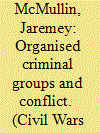| Srl | Item |
| 1 |
ID:
086360


|
|
|
|
|
| Publication |
2009.
|
| Summary/Abstract |
The relationship between criminality and conflict subverts traditional assumptions about organised crime. Consequently, analysis of the 'criminal' must be anchored to specific conflict contexts rather than to a universal typology of organised criminal groups. Organised crime and conflict are interdependent. In several conflict states, organised crime has exacerbated the level of violence and contributed to conflict's intractability. Conflict, meanwhile, creates unique opportunities for criminality to flourish and amplifies the threat that criminal groups pose to security, development and governance. Unless the peculiar supply and demand dynamics of conflict are addressed by the peace process, law enforcement initiatives alone will fail.
|
|
|
|
|
|
|
|
|
|
|
|
|
|
|
|
| 2 |
ID:
106649


|
|
|
|
|
| Publication |
2011.
|
| Summary/Abstract |
This article uses recent experience in Angola to demonstrate that young fighters were not adequately or effectively assisted after war ended in 2002. The government's framework excluded children from accessing formal disarmament, demobilisation and reintegration (DDR) programmes, and its subsequent attempts to target children have largely failed. More critically the case of Angola calls into question the broader effectiveness and appropriateness of child-centred DDR. First, such targeting is inappropriate to distinct post-conflict contexts and constructs a 'template child' asserted to be more vulnerable and deserving than adult ex-combatants, which does little to further the reintegration of either group, or the rights of the child in a conflict context. Second, child-centred reintegration efforts tend to deny children agency as actors in their own reintegration. Third, such efforts contribute to the normalisation of a much larger ideational and structural flaw of post-conflict peace building, wherein 'success' is construed as the reintegration of large numbers of beneficiaries back into the poverty and marginalisation that contributed to conflict in the first place.
|
|
|
|
|
|
|
|
|
|
|
|
|
|
|
|
| 3 |
ID:
057775


|
|
|